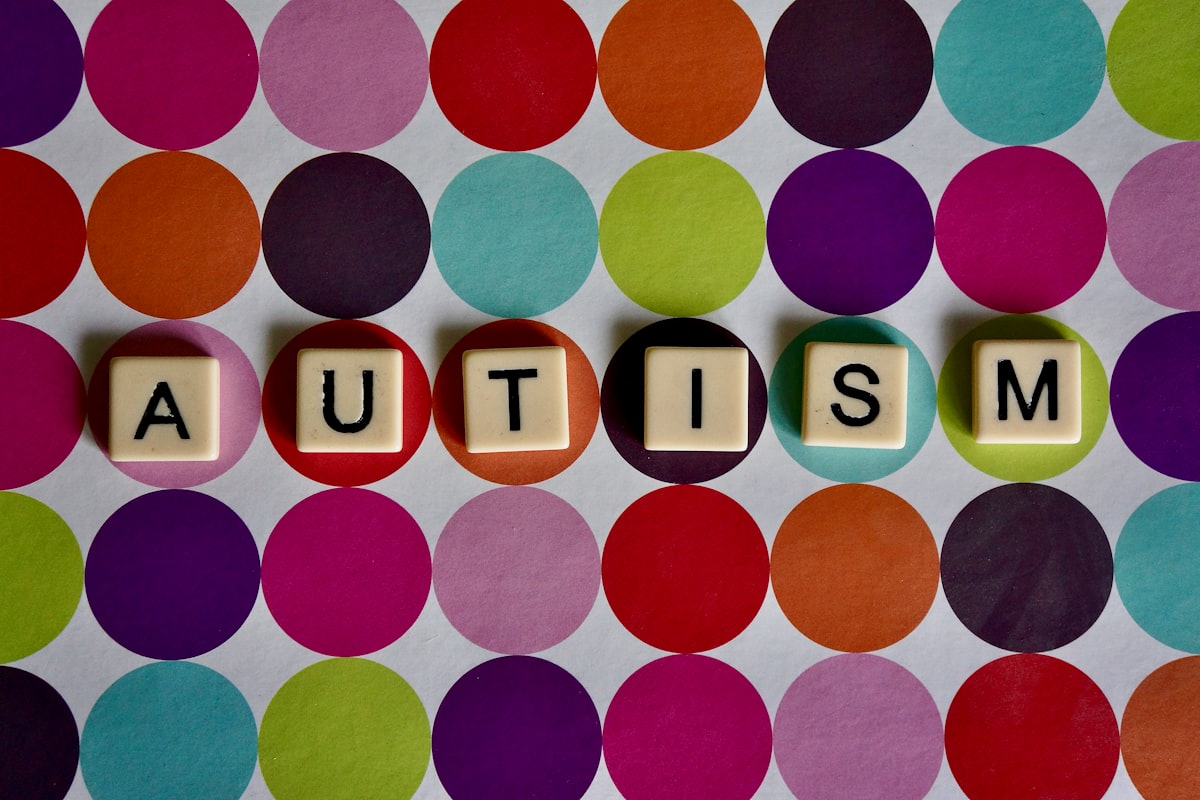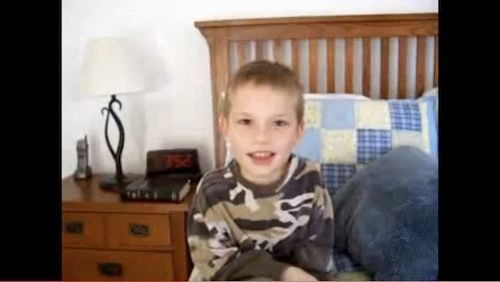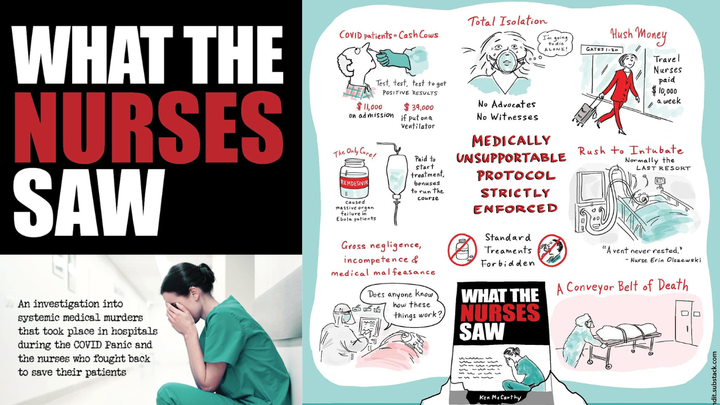Autism Recovery with the GAPS Diet: One Mother’s Story
Is recovery from autism possible? Watch these astounding before and after videos of a child on the autism spectrum who is recovering.


Is recovery from autism possible? Watch these astounding before and after videos of a child on the autism spectrum who is recovering.
Sam is a 5-year-old boy who is on the autistic spectrum. After just 3 months on the GAPS Diet, Sam’s recovery is simply amazing. When I saw these videos, I cried.
Watch the Videos
Watch the before and after videos, then read the interview that follows with Sam’s mom, Janice.
The first 3 videos are before the GAPS diet, taken about a year ago, and the last video is Sam after just 3 months on the GAPS diet.
BEFORE GAPS DIET:
AFTER GAPS DIET:
Autism Recovery with the GAPS Diet: One Mother’s Story
I interviewed Janice, Sam’s mother, to find out more about what they went through and how the GAPS diet is helping her son heal. (You can read more about Janice on her SAHMville blog.)
CHEESESLAVE: When did you first think there might be a problem with your son? What were some of the early indicators that he might be on the spectrum?
JANICE: Sam is our first-born child, so I think there were early indicators that we missed simply because we were new at parenting. Looking back, I can remember that he was always extremely sensitive to sound, even as an infant. In our home the bedrooms are at the extreme opposite end of the house from the kitchen. If Sam was asleep in his bedroom and someone sneezed or got ice out of the icemaker in the kitchen, Sam would wake up screaming.
When he was awake he would lie in the floor and watch the ceiling fan spin for long periods of time. To get him to sleep I had to tightly swaddle him for a much longer time than I did our later children. Something about being tightly wrapped would calm him enough to where he would go to sleep. When I laid him in his crib he would violently thrash his head from side to side until he finally put himself to sleep.
I first started to worry when we realized that his gross motor skills were behind. Sam did not show any interest in moving to get a toy. If something were out of his reach, he just didn’t care. He would lay there and just do nothing. He would look around at things, but that’s it.
We struggled with figuring out “How do you motivate a baby to want to move to get something? Don’t most babies have that instinctual desire to discover new things?” Sam didn’t.
Sam did not begin to crawl on his belly until after he was a year old. He did not take his first independent steps until he was 20 months old. We were in physical therapy with him during this time. The therapist worked with him for months and months. Her final diagnosis was that there was nothing physically wrong with Sam. She decided that he was simply lazy and unmotivated to move.
I remember when Sam was 19 months old we visited a theme park and rode the train in the park. The first time the train’s whistle blew, Sam began screaming. Not just crying because the sound startled him, but screaming as if he were being tortured… and he didn’t stop. He alternated between screaming and fussing throughout the entire ride.
Back at home, Sam was completely enthralled with anything having to do with a television or computer screen. He could sit forever and watch anything. It didn’t matter if it were a cartoon or the news, he was enthralled no matter what. There were many, many times when I would try to get Sam’s attention but he would act as if I hadn’t said anything. I would have to physically go up to him, grab his chin, and make him look at me to get his attention.
At Sam’s 2-year check-up I mentioned autism to his doctor. The doctor replied that Sam was too social to be autistic. Sam was social, she was correct in that, but I felt that there were a lot of other red flags that worried me.
The doctor finished by saying that Sam just had “quirks.” Quirky sounded a lot better than autistic, so I accepted that and left.
CHEESESLAVE: When were you sure that he was on the spectrum? Did you get an official diagnosis?
JANICE: We have never gotten an official diagnosis. After dealing with Sam’s doctor and the physical therapist, I became a little disenchanted with the idea of the medical community helping me out. I started reading and researching whatever I could find. I think I started using the phrase “Sam has some autistic tendencies” when he was around three years old.
CHEESESLAVE: What kinds of difficulties did Sam face? Can you give us an idea of some of the behaviors he had? We can see some of them in the videos but I’m curious if you can elaborate.
JANICE: As Sam got older he developed more severe autistic tendencies. The sensitivity to sound and light stayed with him. He began having what we call “meltdowns” over insignificant little things. For instance, if he was watching a VHS tape and the movie ended he HAD TO watch the movie in reverse as it was being rewound. If you attempted to press “Stop” and then rewind he would have a meltdown.
His meltdowns consisted of him hitting his ears or the sides of his head while he jumped up and down from one foot to the other. He would scream, “Noooooo!” as he did this. There was no calming him or reasoning with him during a meltdown.
He would hum constantly. Not like he was humming a song or anything, just a constant humming sound. It seemed to be never-ending.
Sam could not sit still. It was as if his body was incapable of being at rest. His hands moved often. The type of movement changed over the years. At first it was more of an arm pumping movement, then it transitioned into a rapid clapping of hands. Later he began to clap his wrists instead. Now he will still have involuntary hand movement when he gets very excited but it is more of a finger movement instead of the entire hand or arm.
Sam had several other autistic tendencies as well. He talked very loudly. He did not ever seem to grasp what “danger” was. He was constantly chewing on things. He destroyed numerous sippy cups, shirts, and toys by chewing on them. He didn’t show pain very often.
Once, he was outside on the kids’ playland and was stung by a wasp. He cried and came inside, pointing to a spot on his hand. I put ice on it and he fussed a bit then shook it off and went on his way. The next day we found a total of three huge whelps on his body from the wasps’ nest that he had disturbed… one on his hand, one on his arm, and another on his ear.
Sam would often do what we call “TV Talk.” He would memorize shows and movies. Then, when you asked him a question, he would simply respond with a quote from a TV show or movie. What’s odd is that usually the regurgitated quote applied to the question you had asked.
So, when strangers would speak to him, they would be unaware that they were simply hearing TV Talk. Other times his response made no sense at all because the TV Talk didn’t apply to the question at all. So, it was extremely rare for Sam to speak something that came out of his own mind. Nearly everything that came out of his mouth was something he had memorized.
We had a very difficult time potty training Sam. We finally trained him to urinate on the potty, but we struggled with controlling bowel movements for the longest time. It wasn’t until we started the Feingold Diet in July 2009 that Sam was able to control his bowel movements. He was four years and four months old. The Feingold Diet removed all artificial colors, flavors, sweeteners, and preservatives. On day four of that diet, Sam was able to consistently control his bowels.
Also, prior to implementing the Feingold Diet, Sam would awaken from a sound sleep just screaming for no reason. When we would go to him it was evident that he was in a semi-conscious state, still half-asleep, but screaming as if he were terrified. These instances also stopped when we removed artificials using the Feingold Diet.
In addition to these negative behaviors, Sam also exhibited some talents that were extraordinary for a child his age. At age 2, Sam was capable of spelling and reading a large array of words, including large words like ‘guitar’ and ‘family.’ At this age he was also able to recite the presidents of the United States, in order, both forwards AND backwards. As he got older, he would study telephone books and cookbooks for hours on end. It got to the point where he could tell you the exact page numbers of specific recipes when asked.
CHEESESLAVE: Can you tell us more about how/when you started on gluten-free and what happened as a result?
JANICE: We removed gluten from our diet in April 2010. We were already eating a mostly WAPF (Weston A. Price Foundation) diet at this time. Sam had just turned 5 years old the month before. I compensated removing gluten by adding in more gluten-free oats and brown rice, so we still had a large amount of grains in our diet. I did occasionally use a gluten-free boxed cake or brownie mix if we had a special event to go to.
I started noticing improvement on Day 3 of our gluten-free WAPF diet. I documented that he had played well with his little brother and sister. Prior to this, he might play in the same room as them, but it was extremely rare for him to interact and play with them.
On Day 4 we had friends over to play. Sam would normally spend that time walking around outside by himself, but this day he actually interacted with the other children. It was awkward play, but he was interested in being around the other children. The other children’s mother even noticed the change and pointed it out. That was an awesome day.
That change, however, wasn’t consistent. He continued to have good days and bad days. The meltdowns were still often there too. I did see enough change to keep gluten away from him, so Sam hasn’t consumed gluten since April 2010.
CHEESESLAVE: Can you tell us more about how and when you started the GAPS diet, what happened (if anything)? Did you notice any benefits or not? How long were you on it before you stopped the GAPS diet?
JANICE: We started full GAPS (not the “intro GAPS diet”) in October 2010. We stayed on that diet for 8 weeks. [Note: The “intro GAPS diet” is more restrictive than the “full GAPS diet” and is recommended in the beginning.]
During that time I noticed some improvements in a few of Sam’s behaviors, but they were few and inconsistent. The improvements were so few and so inconsistent that I began doubting whether the small changes were worth the restrictiveness of the diet, so we abandoned Full GAPS and went back to a gluten-free WAP diet in December 2010.
To be fair, I did not include fermented vegetables to the extent that I should have while we were on Full GAPS. I did a good job removing the hard-to-digest foods, but slacked on providing probiotics during this time.
CHEESESLAVE: What happened when you stopped the GAPS diet?
JANICE: When we stopped Full GAPS we were giddy over being able to have soaked oatmeal for breakfast and Spanish rice for supper and homemade hot chocolate with raw cow’s milk. The kids were able to have maple syrup popcorn in their stockings at Christmas. It was wonderful!
Then Sam’s behaviors became simply unbearable. The meltdowns escalated. He was constantly chewing on his shirts and forks and spoons. His sleeping became erratic. He was waking up super-early and being noisy. He was humming and wrist clapping all the time. He began biting his little brother and sister. The TV Talk increased.
Even my husband, who really disliked doing Full GAPS, was interested in starting GAPS Intro after seeing Sam’s regression. It was an absolutely miserable time.
CHEESESLAVE: So now you’ve been on the Intro GAPS Diet for one month now — how has your son changed?
JANICE: Most phenomenal is that now Sam speaks TO us! When you ask him something, you can tell that his answer is coming from Sam’s own mind… not regurgitated TV Talk.
He asks questions. He’s exhibiting curiosity about things that he never paid attention to before. He’ll ask simple things like, “What are we going to have for breakfast in the morning?” Those kinds of questions are huge coming from Sam. He is also saying things like, “Oh, I’m sorry!” when he makes a mistake or gets in trouble. Prior to starting GAPS Intro, he didn’t seem to recognize his own improper behavior.
Sam’s speech pattern is different from most 5-year-olds, though. He speaks slowly and with pauses between his words. You can tell that he is really having to concentrate on the words that are coming out of his mouth. Back when most of his speech was TV Talk, his speech pattern was normal because he was simply reciting it back as he’d heard it. Now that he has to come up with questions of his own, it requires more deliberate thinking.
Sam’s body is capable of being still. He has calmed so much. His hands are at rest more often than before. He is sleeping better. He just seems happier, less agitated and angry than before.
He is more affectionate. Before, when you would ask for a hug, he would come to you and turn to the side while he allowed you to put your arms around him. Now, when I ask for a hug, he will come to me and we will hug belly to belly with our arms around each other.
We’re also starting to notice that Sam is developing a self-preservation instinct, whereas before he did not have a healthy fear of danger. Just yesterday, my husband took the children to walk the trails in the woods of our property. Before, Sam would be in his own little world. He would take off running to wherever he pleased and not pay attention to the possible dangers around him.
Yesterday he was expressing concern for strange noises he heard. When my husband took them to see one of the springs on our property, Sam even made a comment to his 2-year-old brother, “Andrew get away from the water. It’s dangerous!”
CHEESESLAVE: Did Sam have issues with digestion? What kinds of issues (constipation/pain/etc.)? What was it like before and after you started GAPS?
JANICE: Prior to July 2009 when we started Feingold, Sam’s stools were always very loose… not diarrhea, just very very soft. I guess that’s part of why he had such difficulty potty training until then. When we removed the artificials per Feingold, his stools became more solid. He has never been consistent about having bowel movements every day. He would always either skip a day or two in between.
Constipation has never been a problem for Sam either. After Feingold, when he would have a bowel movement, it was always a “healthy” movement. (Those that have studied healthy poop know what I mean here!)
Sam has never complained of stomach pain. However, since his ability to feel pain is different than most, it’s difficult to gauge whether or not he’s actually had stomach pains.
Now that we are in Week 5 of GAPS Intro, Sam’s bowel movements are still similar to before. He is still skipping a day or two in between, but when he does go it is healthy.
CHEESESLAVE: What is challenging for you about doing GAPS?
JANICE: When we’re home, GAPS is not all that difficult. It’s being out away from the house that is difficult for me. Our extended family is not real optimistic about the effects of diet change, so it’s difficult going into social situations where there are lots of naysayers eating things that we cannot have. At this point it is very difficult for our family to be around those that don’t believe in what we’re doing. We’re early enough in the diet that I still need to be surrounded by positivity and support.
Fortunately, I have a close circle of friends that are very supportive of what we’re doing. In the first couple weeks of Intro, they called me every single day to check on our progress. That was such a blessing.
It was also very challenging when I had all three children (ages 5, 4, and 2) experiencing die-off at the same time. Having all three of them fussy and literally lying on the floor screaming for fruit was very, very difficult.
CHEESESLAVE: What benefits have you experienced (other than the obvious — what we can see in the video)? Do you have any other specific examples of benefits?
JANICE: I don’t know how else to describe this except to say that I feel more sane now. I’m currently 5 months pregnant with baby #4, so I’m consuming Full GAPS myself. I don’t know if my change in attitude has more to do with my own physical healing or Sam being easier to deal with now. Perhaps it’s a combination of the two, but I feel more capable and calm throughout the day as things come up. I find that I’m less irritable and short-tempered with the children now. Our days are so much more pleasant and I enjoy my time with the children more.
This week I took all three of the children to the fire station for a field trip by myself. I never would’ve tried that in the past. The thought of Sam having a meltdown or running away from me would’ve kept me from taking all the children to an activity like that. This week we were able to participate in something that his behavior and my fear would’ve kept us from before. Only 5 weeks into the diet and our lives have drastically changed.
CHEESESLAVE: What would you say to someone with a child on the spectrum who wants to try the GAPS diet but is scared or overwhelmed about the idea of getting started?
JANICE: Just do it. It is not fun and it is not easy, BUT… once you take the plunge and start seeing benefits, you’re going to wish that you had started it years earlier.
I spent so much time trying out diets that were less restrictive because GAPS intimidated me. I was hoping that the less restrictive diets would solve our problems and then I could simply avoid GAPS.
Now, seeing Sam’s improvement on GAPS, I wish I would’ve just gone straight into the diet that was the most restrictive, but also the one most likely to heal my son.
Also, find a support system before starting the GAPS intro diet. If you don’t have anyone in real life who is supportive of you, then find a blog or online community that you can visit on a daily basis. I really recommend GapsDiet.com.
Having someone there to bounce ideas off of, or just someone to listen to your woes, is so valuable.
Resources for the GAPS Diet
Learn more about the GAPS Diet on GapsDiet.com.
Read the book by Dr. Natasha Campbell-McBride: Gut and Psychology Syndrome: Natural Treatment for Autism.
Share Your Comments
Do you have a testimonial to share? Do you have questions about the GAPS diet? Please leave a comment below.
Please Share This Post
Do you know someone who has a child on the autism spectrum? Please share this post with them.



Comments ()